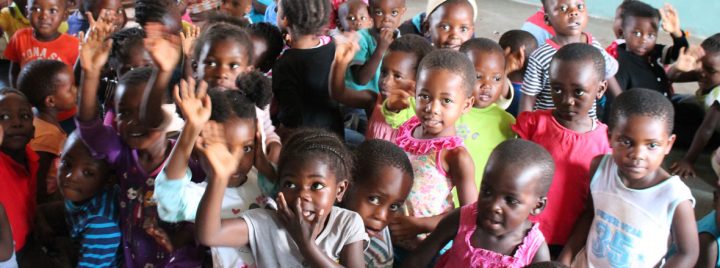History
The Vhutshilo Mountain School
The far north of Limpopo province, home of the VhaVenda people, is one of the poorest regions in South Africa. Over 50% of the population is unemployed, homeless or illiterate; HIV/AIDS is very common and the basic infrastructure, government health facilities and social services are underdeveloped. Children are always very vulnerable in these situations.
Humble Beginnings
Sue-Anne Cook, founder and principal of the school, has lived in the Venda area since 1984. In 2002, responding to the community’s concerns about the growing number of AIDS orphans, she converted her mobile home into two classrooms. Her pick-up truck became the school bus, friends donated furniture, toys and nutritional food, and this was the start of Vhutshilo Mountain School. The name “Vhutshilo” was chosen as it means “life” in the local Tshivenda language.
Church of Scotland
A young volunteer from Scotland was so moved by these children and what this school was doing for them, he took this story home to the congregation of his church. As a result, in 2005, the Inverclyde congregation of the Church of Scotland built a 2-Classroom school at Tsikombani in the Nzhelele Valley.
Pre-school Education
From these humble beginnings the school has grown exponentially and became an integral part of the local community. The school currently has 72 children enrolled, of which 42 are vulnerable and 30 are fee paying.
The school has established a good reputation in the region, as children leaving our school and moving on to primary school invariably do very well. Orphans, vulnerable children and those living with HIV in our care receive an excellent pre-school education with a strong emphasis on positive living. They are confident and speak good English, which gives them a great advantage over their peers from other local pre-schools. This is the reason that children from well-established families, who pay the normal school fees, also attend the school.
Outreach Programmes
A natural progression from the education programme was the development of an Outreach Programme which enables us to provide holistic care to the children, and not abandon them when they leave Vhutshilo Mountain school to continue their education at their village schools.
The programme currently supports around 230 HIV positive children and youth who were born HIV positive and are on Anti-Retroviral drugs. Vhutshilo Mountain School also assists and capacitates their caregivers.
Outreach field workers regularly visit the homes of the HIV positive children to monitor adherence to the Anti-Retroviral drug regimine, and to check food security and possible abuse of the government grants.
In 2007 the doctors at Siloam Hospital shared their concerns regarding non-compliance of children on the Anti-Retroviral drug regime, so the school began to host and facilitate workshops for HIV positive children from the community and surrounding villages.
The caregivers of these HIV+ children (usually elderly grannies) attend separate workshops where they can discuss problems and issues in a relaxed informal environment as opposed to the monthly hospital visits where the doctors and nurses are too busy to deal with individual queries. According to feedback from the doctors at Siloam Hospital, this outreach programme has dramatically decreased the number of children dying due to non-compliance to the Anti-retroviral drugs.
Peer Educators
The older children in the group, who have been with us for more than 8 years, are beginning to play an important role as peer educators, not just for the younger children, but also in the community at large. They are healthy and open regarding their status, making them excellent role models for Anti-Retroviral drugs and Positive Living. They have also started visiting refugee camps where they interact with the youngsters and urge them to have safe sex, get tested and educate themselves about HIV/AIDS.
Oxfam Australia
Vhutshilo Mountain School’s approach attracted the attention of Oxfam, as they were the first organisation that organised workshops specifically for children. Oxfam Australia provided basic organisational and specific project funding from 2007, but unfortunately, withdrew from South Africa at the end of March 2016. They supported Vhutshilo Mountain School during the last funding year to review their strategy and to develop a sustainable path forward. They also conducted and published a case study, Vhutshilo Mountain School: A social study of a rural Paediatric Anti-Retrviral programme in South Africa, to enable Vhutshilo Mountain school to pass their successes on to similar organisations in South Africa.
Hope for Limpopo
Hope for Limpopo, Inc., a USA based nonprofit, was specifically created to assist vulnerable women, children and families in the Limpopo Province of South Africa. Since 2003 HFL has been a consistent and valuable resource providing financial assistance to VMS with sponsorship of our children, school building capital, educational toys, launching of adjunct programs and bestowing smaller grant requests that contribute to the fulfillment of our mission. HFL continues to be a valued friend and support system for Vhutshilo Mountain School and our surrounding communities.
Vhutshilo’s Children’s Support Group Model
Other AIDS clinics and organisations heard about the success of the Vhutshilo Mountain School’s Children’s support group and began asking for assistance. In response, we formed a partnership with Thohoyandou Victim Empowerment Programme (TVEP) and a dialogue was held with representatives from two other Government Hospitals attempting to run support groups for children.
In the dialogue, Caregivers and children from Vhutshilo Mountain School answered questions and told the group why they thought their support group was so successful. The government officials were amazed at the openness of the children and their high self-esteem. The officials explained that they were still struggling with whether or not to even tell the children they were HIV+; such fears clearly perpetuate the stigma around the disease, but the dialogue was one step toward overcoming it.
Vhutshilo’s Ambassadors of Change
In 2012, Woo, a member from the children’s support group was on SABC 2 talking openly about her HIV status and encouraging pregnant women to take Nevirapine to prevent mother-to-child transmission. She was also the leading story in the Cape-based Ubuntu magazine in December 2012 talking about positive living. In 2015, Woo was invited to facilitate an “I have something to say” campaign at a Youth summit at the University of Cape Town. Of the 18 youngsters chosen for this summit from all the provinces, four of them were from the Vhutshilo Mountain School support group. They discussed issues like rape, HIV, mental illness and the state of public health services in our country.
Our Youth Ambassadors talk openly at community celebrations such as World AIDS Day. Often it is very surprising for the audience when a youngster stands up and says “I am HIV+ ” The gasps of disbelief and the questions asked, prove beyond a shadow of doubt that this programme is going a long way to dispell the myths and stigma associated with the disease. At one event, two men stood up and openly disclosed their status. The one, said he goes to a clinic 60 km away to collect his ARV’s as he is too afraid to get them locally. But, he said, if these youngsters can be open then he can too.
Skills Development Programmes
We also have skills training programmes for the older youth who may not be doing well academically. They attend trainings on sewing, carpentry, plumbing, computer literacy, and basic home maintenance. This is one of our new initiatives to support young people to get a focus in life and to earn an income for themselves.
Jobs and Work Opportunities
The 12 members of our permanent staff, as well as volunteers, are from the surrounding villages, and the school employs 3 contract drivers who transport the children to and from school. Local businesses and artisans have come to rely on Vhutshilo Mountain school for both employment and trade. With a local unemployment rate of over 50% (most of them are women) this small school is making a significant difference in assisting the people of this community to achieve a slightly higher standard of living.



